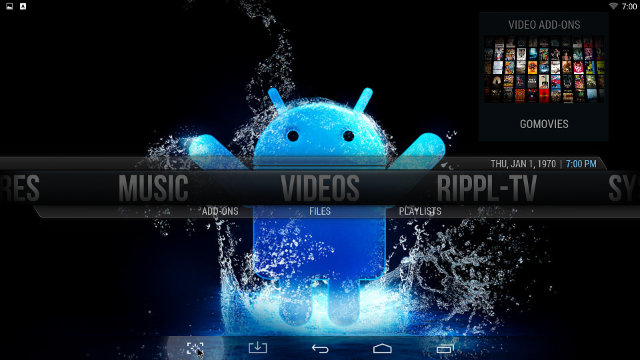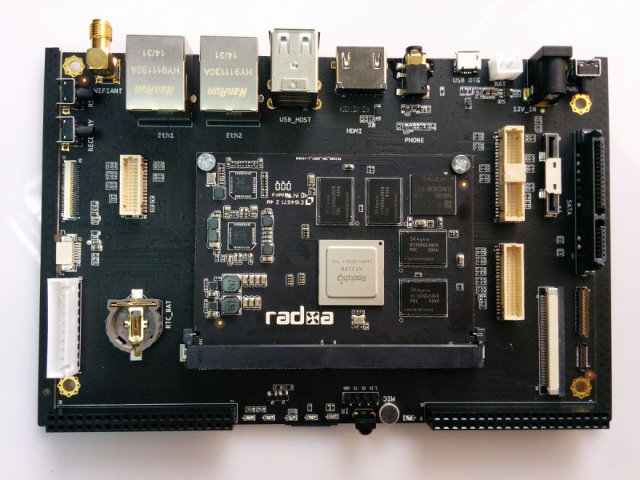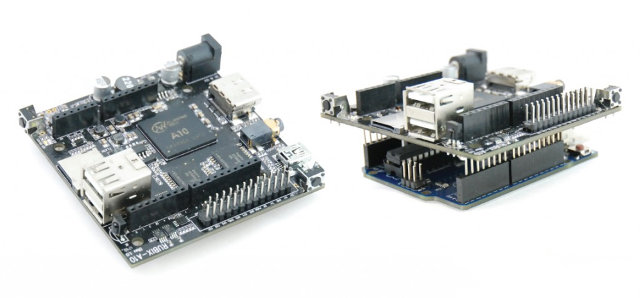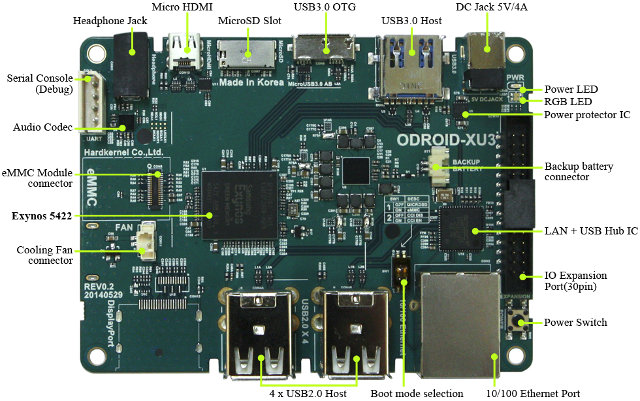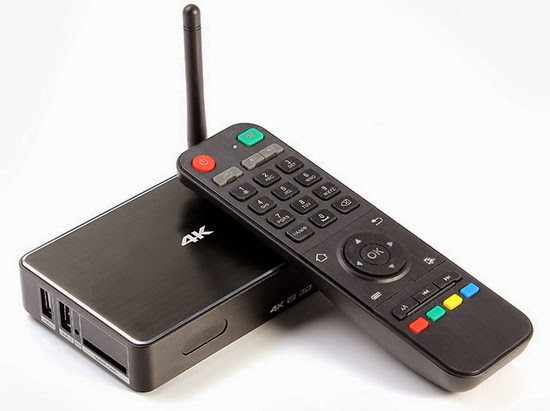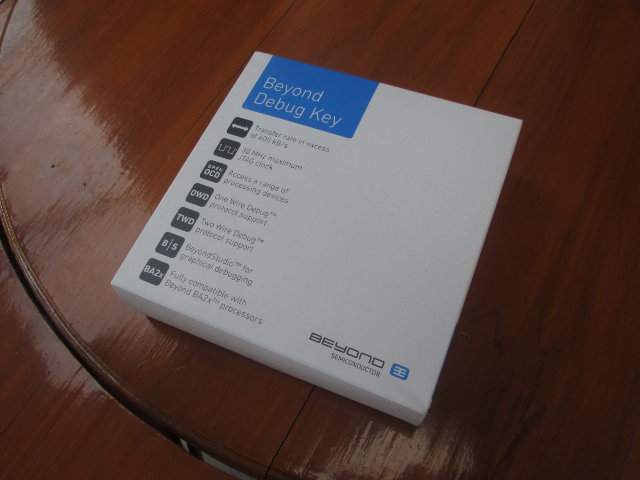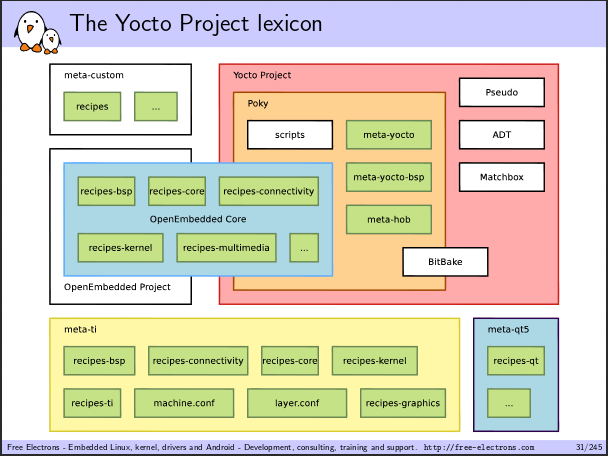Rippl-TV is an Android TV box based on an update revision of Eny Techology/Shenzhen Tomato M8 (square) TV Box with an Amlogic S802 quad core processor, but featuring a different firmware with an alledgedly customized Android 4.4 OS called utilOS, and a launcher based on XBMC also called Rippl-TV. I’ve already written an unboxing post, including pictures of the board, so today I’l focus on the full review, and compare the performance to the original M8, as well as a closer look at the new user interface. First Boot, Settings and First Impressions Rippl-TV comes with an IR remote, and as long as your stay in XBMC and play videos, it’s fine, but as this type of remote is usable with most Android apps, I used Mele F10 Deluxe air mouse instead to control the device. I’ve connected an Ethernet cable, an HDMI cable, a USB hard drive, and a […]
Radxa Rock 2 Development Board Pictures and Specifications
Radxa Rock 2 is an upcoming development board based on Rockchip RK3288 quad core Cortex A12/A17 processor, which will run Android, and I would expect it to have better support for Linux desktop distributions than the original Radxa Rock board thanks to the current work done by Rockchip and Google on Chromium OS, which could bring 2D/3D graphics, and hardware video decoding to the platform. The board is not available for purchase yet, but pictures have been published, and specifications released. So the new board is comprised of a baseboard and a system-on-module (SoM), which should help Radxa’s customers design their own products, while using Radxa SoM, and doing early development on Radxa Rock 2 board. Radxa SoM specifications: SoC – Rockchip RK3288 quad core ARM Cortex-A17 [email protected] with ARM Mali-T764 GPU with support for OpenGL ES1.1/2.0/3.0, OpenCL 1.1, DirectX 11 System memory – 2GB (4GB optional), 64bit DDR3@800Mhz Storage […]
Android 5.0 Lollipop Source Code Pushed to AOSP
As Nexus 6 smartphone, Nexus 6 tablet, and Nexus Player have now started to ship, Google has pushed Android Lollipop to AOSP (Android Open Source Project), as well as images for Nexus 4, Nexus 5, Nexus 7 (2012 and 2013), and Nexus 10. You’ll soon be able to retrieve the source code with the following command lines [Update: I still can’t use the lollipop-release branch to retrieve the code, so instead you can use android-5.0.0_r1 tag for Nexus 9, or android-5.0.0_r2 tag for Nexus Player / Android TV]: repo init -u https://android.googlesource.com/platform/manifest -b android-5.0.0_r1 repo sync Currently repo init fails with: error: in init -u https://android.googlesource.com/platform/manifest -b lollipop-release –repo-url=https://gerrit.googlesource.com/git-repo –repo-branch=stable: revision lollipop-release in manifests not found But everything should come online soon. In the meantime, you could still browse the code. Anyway that means Android 5.0 images for mini PCs, TV boxes and other devices will hopefully be available in […]
Rubix A10 is an Arduino Shield Running Linux Powered by Allwinner A10 Processor
There are plenty of ARM Linux boards featuring Arduino compatible headers such as UDOO, PcDuino, ATSAMA5D3 Xplained, etc…, and Rubix A10 looks like one of these boards, as it comes with an Allwinner A10 processor, boast Arduino compatible header, and runs Linux or Android, but instead of simply accepting Arduino shields, Rubix A10 can be used as a shield itself for Arduino (UNO?)boards. Rubix A10 specifications: SoC – Allwinner A10 ARM Cortex A8 processor @ 1.0 Ghz with Mali-400 GPU System Memory – 1GB DDR3 Storage – 4 to 8 GB MLC 64-bit ECC NAND Flash, micro SD slot up to 128 GB Video Output – HDMI 1.4 up to 1080p60 Audio I/O – HDMI, 3.5 mm jack for MIC + headphone. Connectivity – 802.11b/g/n Wi-Fi up to 150Mbps, USB – 2x USB 2.0 host interfaces, 1x mini USB OTG 2.0 port Expansions Headers Arduino compatible headers 26-pin Raspberry Pi […]
$99 ODROID-XU3 Lite Development Board Powered by Exynos 5422 Octa Core Processor
Hardkernel is known for their low cost Exynos based ODROID boards such as the $59 ODROID U3 board based on Exynos 4412 quad core SoC, and with ODROID-XU3, they also have a more powerful Octa-core Exynos 5422 board which sells for a premium price of $179. The company has now decided to offer a cheaper version of the board, which they call “ODROID-XU3 Lite” and lacks DisplayPort, the current and voltage sensors, and uses an Exynos 5422 processor clocked at 1.8/1.3 GHz instead of 2.0+/1.4 GHz for the original board. Price? A cool $99. ODROID-XU3 Lite specifications: SoC – Samsung Exynos 5422 quad core ARM Cortex-A15 @ 1.8GHz quad core ARM Cortex-A7 @ 1.3GHz in big.LITTLE configuration with Mali-T628 MP6 GPU supporting OpenGL ES 3.0 / 2.0 / 1.1 and OpenCL 1.1 Full profile System Memory – 2GB LPDDR3 RAM PoP (933Mhz, 14.9GB/s memory bandwidth, 2x32bit bus) Storage – Micro […]
How to Flash Firmware to Realtek RTD1195 Media Players
Android TV boxes based on Realtek RTD1195 SoC are cheap (about $60), with a relatively slow dual core Cortex A7 processor, but include fast interfaces such as USB 3.0, Gigabit Ethernet, and sometimes SATA, and are said to be very good at playing videos. After several months of development since they’ve first been spotted, RTD1195 media player are finally shipping. One of the models is M-195, which had its firmware recently released, and can be downloaded from copy.com, filefactory, mediafire, or solidfiles servers. This firmware is based on Android KitKat 4.4.2, with build number rtk-phonenix-eng 4.4 krt160 eng.ton.20141024.094201. Firmware update is pretty easy, and is operating system agnostic, since all you need to do is to basically copy the firmware file to a USB flash drive. A PC is not even necessary, as you can download the file and extract it directly from the mini PC itself. The same procedure […]
Beyond Debug Key Enables JTAG & UART Debugging, Supports OpenOCD
Beyond Semiconductor, a fabless semiconductor company based in Slovenia which develops their own 32-bit BA2x IP cores, has sent me one of their development tool, namely Beyond Debug Key supporting JTAG and UART interfaces either with BeyondStudio for the company’s BA2x processor, or the open source suite OpenOCD for other processors. Since I don’t have any Beyond Semi boards, I instead configured it, and quickly tried it with Atmel SAMA5D3 Xplained ARM Cortex A5 development board, and OpenOCD (Open On-Chip Debugger). The debug tool comes in the package above describing the key features of the kit: Performance Transfer rate in excess of 600 kB/s 30 MHz maximum JTAG clock Less than 20 μW power draw from target board Compatibility Fully compatible with Beyond BA2x processor family Access any 8-bit, 16-bit, 32-bit or 64-bit processors via JTAG Works with all JTAG compliant devices Software Support OpenOCD for access to a range […]
Free Electrons Publishes Yocto & OpenEmbedded Training Materials
Free Electrons is a small (9 people) engineering company focusing on embedded Linux / Android, and open source software, which also happens to have ported several ARM SoC to the mainline kernel. From time to time, they also offer training sessions, and release course materials publicly. Their latest training is a 3-day course dealing with the Yocto Project and OpenEmbedded, using BeagbleBone Black development board for lab sessions, and all materials have been released under a Creative Commons license. The training consists in: Understanding the Yocto Project Using it to build a root filesystem and run it on your target Writing and extending recipes Creating layers Integrating your board in a BSP Creating custom images Application development with an Eclipse SDK Three files are released: yocto-slides.pdf – Yocto Project and OpenEmbedded Training presentation slides (245 pages) give an overview of various build systems, before getting more details about the Yocto […]


